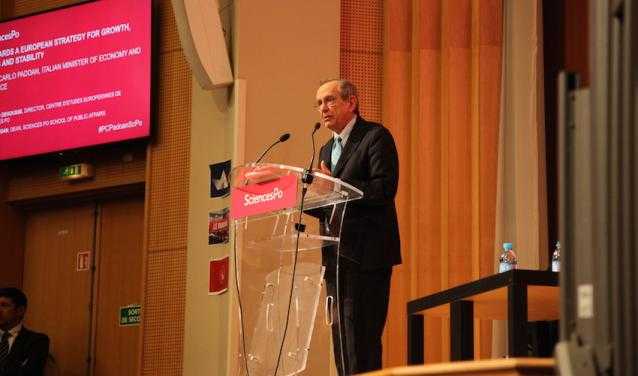Home>“More growth and welfare ultimately come from deeper integration”

05.04.2016
“More growth and welfare ultimately come from deeper integration”
On 29 March 2016 at Sciences Po, Italian Minister of Economy and Finance Pier Carlo Padoan gave a lecture entitled “Towards a European Strategy for Growth, Jobs and Stability”. He suggested setting up a new political agenda to improve economic growth and fiscal coordination in the European Union.
With respect to the difficulties facing the EU of late, from a gloomy economic outlook and the spectre of deflation to the current immigration challenges, Professor Padoan called for coordinated policy responses and common initiatives to foster European integration.
Flexibility and fiscal policy: making the case for a common EU Finance Minister and a European Fiscal Board.
In the current European agenda, fiscal discipline combined with the pursuit of structural reforms and the relaunch of investments seem to be the main economic and political drivers. In this context, stressing recent improvements to the EU fiscal framework, Professor Padoan emphasised the importance of leveraging flexibility. To him, “flexibility is not an excuse for fiscal irresponsibility, [rather] the way to combine proper investment strategies with structural reforms [while] promot[ing] fiscal responsibility”.
The European economies, still suffering from the aftermath of the 2008 crisis, would certainly benefit from a better coordination of fiscal policies. For the Italian Minister, this coordination should not only be embodied by a newly created EU Finance Minister, but should also involve introducing a European Fiscal Board, which would serve as an authority to oversee the consistency and improvement of Member States’ fiscal standards.
Enhancing the coordination of structural reforms and investments: towards a European public policy.
Taking Italy’s ongoing policy reforms as an example, Professor Padoan also showed his commitment to structural reforms as part of a broad forward-looking policy framework to boost the European economies in the medium and long terms. Ultimately, the growth of investment depends on structural reforms and their spillover effects across countries.
Advocating for better coordination among EU member states, he also suggested the creation of a common European public policy to deal with the increasing presence of European public goods, ranging from economic spillovers to border controls and security.
All about trust: credible commitments to prevent moral hazard and foster integration.
If there is a single issue that lies at the core of the European project, it is the importance of trust among member states. Yet Professor Padoan underlined the persistent lack of confidence in the EU, which often leads to political deadlocks and may prevent further political integration. One way to tackle this crucial issue for governments is to define and meet credible commitments, so as to prevent moral hazard and foster European integration.
Professor Padoan’s lecture comes as a breath of fresh air in a gloomy European context. The creation of a European Finance Minister, the promotion of flexibility, and, above all, the fostering of trust among national governments are all key to a course of action that will “make the best of our European institutions”.
By Gael Sirello, Olivier Sirello and Riccardo Artuso, students on the Master of Economics and Public Policy programme at the Sciences Po School of Public Affairs.